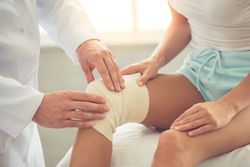4 FAQ About Knee Replacement Surgery

Knee pain can impact almost every aspect of your life. From going food shopping to getting into your car, the discomfort will make even simple tasks unenjoyable. If you think you may need a knee replacement to alleviate these symptoms and improve your quality of life, learn more about the procedure below.
Common Questions About Knee Replacement Surgery
1. How do you know if you need knee surgery?
If you have significant, ongoing knee pain, your doctor may suggest non-surgical options, such as losing weight, getting steroid injections in the area, or trying physical therapy, before surgery. However, if these techniques don’t help with your discomfort, it may be time to consider replacing the parts of your knee that are causing friction and pain.
2. What happens during the procedure?
During knee surgery, you'll be sedated under general anesthesia while a surgeon makes an incision across the front of your knee. Next, they'll remove damaged cartilage and a small amount of bone from your knee and add the artificial component to improve your range of motion. When the parts are in place, they'll stitch the knee and wrap it to help the wound heal.
3. How long will recovery take?

To improve your comfort, your surgeon will place a nerve block around the knee during the operation. While some patients experience discomfort afterward, most people find that they're in less pain following the surgery, since the joint is more comfortable.
Many people can resume daily activities, including driving, between three to six weeks after surgery. Your chances of making a speedy recovery are also more likely if you focus on physical therapy and follow your doctor's recommendations.
4. What are the chances the surgery will be successful?
Knee surgery is a highly effective procedure. Approximately 90% of patients who receive this treatment experience pain relief, and 95% report that they’re satisfied with the results.
If your knee pain is impacting your life, turn to Orthopaedic Associates of Rochester in New York for help. These professionals can assist with everything from sports injuries and knee replacement to joint and back pain. To find out more about how they can help get you back on your feet, call (585) 723-3000.
About the Business
Have a question? Ask the experts!
Send your question

